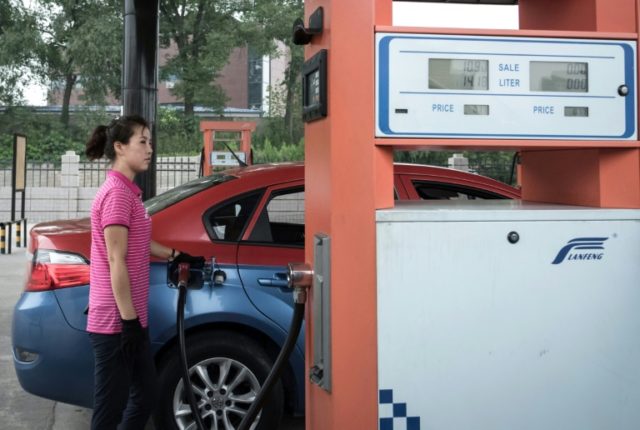An analysis of market data performed by Reuters on Tuesday found the price of fuel in North Korea declining by almost 50 percent since late March, which strongly suggests that tough sanctions against North Korea’s nuclear missile program have been systematically undermined, most likely with the assistance of China.
The data was compiled by a group of North Korean defectors who run a news website called Daily NK. They kept track of fuel prices in the reclusive Communist dictatorship by making frequent telephone calls to private traders. They found gas prices declining by 44 percent since March, with a 33 percent slide in June alone.
“My assessment is that there was a greater inflow from abroad, especially China since Kim’s trips there,” said Daily NK researcher Kang Mi-jin, referring to North Korean dictator Kim Jong-un’s three visits to China for meetings with Chinese President Xi Jinping. The first of those visits took place in March, right about the time fuel prices in North Korea began to decline.
Reuters quoted a Chinese official insisting his government has not helped North Korea undermine sanctions and has duly reported all oil shipments to the U.N. Security Council. Chinese and Russian ships have been repeatedly caught transferring fuel to sanctioned North Korean tankers at sea, but their respective governments denied involvement in the illegal transfers.
Daily NK’s researchers also found the price of rice surprisingly stable for a North Korean economy that contracted by 3.5 percent last year, which might be further evidence of a plan to insulate North Korea from the most painful and politically destabilizing effects of the sanctions regime. Reuters repeats a widely-held estimate that sanctions have caused relatively little damage to North Korea so far, except for some easily-ignored villagers in the hinterlands, but the real pain could begin next year, even if surreptitious efforts to provide Pyongyang with vital fuel and food supplies continue.
North Korean official Ryu Myong-son arrived in Beijing on Monday on a mission to “strengthen economic ties with its one and only ally,” as the South China Morning Post put it.
Ryu’s visit just happens to coincide with a “U.S. sanctions enforcement notice that highlighted Washington’s concerns about possible breaches of the UN embargo”:
The advisory note issued on Monday night urged the international community to stay aligned with the current UN sanctions regime, with the State Department saying: “The international community cannot let up on pressure until the DPRK denuclearizes.”
It highlighted evasion tactics used by North Korea that could expose businesses – including manufacturers, buyers and service providers – to sanctions compliance risks.
It added that goods, services, and technologies manufactured in North Korea may be listed as being made in other countries.
The United States filed a complaint with the U.N. Security Council in July accusing North Korea of flagrantly violating U.N. sanctions on oil imports, citing the large number of illegal ship-to-ship transfers.

COMMENTS
Please let us know if you're having issues with commenting.